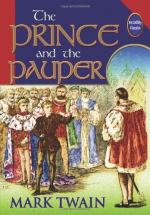The mock King’s cheeks were flushed with excitement, his eyes were flashing, his senses swam in a delirium of pleasure. At this point, just as he was raising his hand to fling another rich largess, he caught sight of a pale, astounded face, which was strained forward out of the second rank of the crowd, its intense eyes riveted upon him. A sickening consternation struck through him; he recognised his mother! and up flew his hand, palm outward, before his eyes—that old involuntary gesture, born of a forgotten episode, and perpetuated by habit. In an instant more she had torn her way out of the press, and past the guards, and was at his side. She embraced his leg, she covered it with kisses, she cried, “O my child, my darling!” lifting toward him a face that was transfigured with joy and love. The same instant an officer of the King’s Guard snatched her away with a curse, and sent her reeling back whence she came with a vigorous impulse from his strong arm. The words “I do not know you, woman!” were falling from Tom Canty’s lips when this piteous thing occurred; but it smote him to the heart to see her treated so; and as she turned for a last glimpse of him, whilst the crowd was swallowing her from his sight, she seemed so wounded, so broken-hearted, that a shame fell upon him which consumed his pride to ashes, and withered his stolen royalty. His grandeurs were stricken valueless: they seemed to fall away from him like rotten rags.
The procession moved on, and still on, through ever augmenting splendours and ever augmenting tempests of welcome; but to Tom Canty they were as if they had not been. He neither saw nor heard. Royalty had lost its grace and sweetness; its pomps were become a reproach. Remorse was eating his heart out. He said, “Would God I were free of my captivity!”
He had unconsciously dropped back into the phraseology of the first days of his compulsory greatness.
The shining pageant still went winding like a radiant and interminable serpent down the crooked lanes of the quaint old city, and through the huzzaing hosts; but still the King rode with bowed head and vacant eyes, seeing only his mother’s face and that wounded look in it.
“Largess, largess!” The cry fell upon an unheeding ear.
“Long live Edward of England!” It seemed as if the earth shook with the explosion; but there was no response from the King. He heard it only as one hears the thunder of the surf when it is blown to the ear out of a great distance, for it was smothered under another sound which was still nearer, in his own breast, in his accusing conscience—a voice which kept repeating those shameful words, “I do not know you, woman!”
The words smote upon the King’s soul as the strokes of a funeral bell smite upon the soul of a surviving friend when they remind him of secret treacheries suffered at his hands by him that is gone.
New glories were unfolded at every turning; new wonders, new marvels, sprang into view; the pent clamours of waiting batteries were released; new raptures poured from the throats of the waiting multitudes: but the King gave no sign, and the accusing voice that went moaning through his comfortless breast was all the sound he heard.




